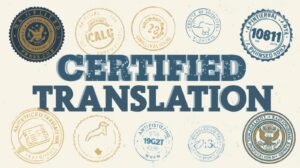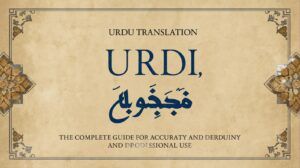In today’s globalized world, clear communication across languages is no longer a luxury—it is a necessity. Whether you are applying for immigration, pursuing higher education, handling legal documents, or expanding your business internationally, one term keeps coming up: certified translation.
 wwhttps://setranslations.uk/w.yourwebsite.com/certified-translation
wwhttps://setranslations.uk/w.yourwebsite.com/certified-translation
But what exactly does certified translation mean? Why is it important, and how do you choose the right service? This guide will walk you through everything you need to know about certified translation, its process, benefits, and how it differs from regular translation.
What is Certified Translation?
Certified Translation refers to a translated document accompanied by a signed statement from a qualified translator or translation agency, verifying that the translation is complete and accurate. This certification is often required by government authorities, courts, universities, and businesses to ensure the authenticity of a translated document.
For example, if you are submitting your birth certificate, marriage license, or academic transcripts in another country, certified translation assures the receiving institution that the content is accurate and trustworthy.
When Do You Need Certified Translation?
Certified translation is typically required in situations where accuracy and legality are crucial. Common scenarios include:
- Immigration Documents—Passports, visas, birth certificates, and naturalization papers.
- Legal Papers—Court documents, affidavits, contracts, and patents.
- Educational Records – Diplomas, transcripts, recommendation letters, and certificates.
- Business Use – Contracts, financial records, compliance documents, and regulatory filings.
In short, whenever an official institution demands proof of authenticity, certified translation becomes mandatory.
Certified vs. Notarized Translation
Many people confuse certified translation with notarized translation. Let’s clear up the difference:
- Certified Translation—The translator or agency provides a certificate of accuracy confirming the translation is complete and true to the original.
- Notarized Translation – A notary public verifies the identity of the translator but does not check the quality of the translation.
Depending on your requirement, you may need one or both. Immigration offices often require certified translation, while certain legal processes may demand notarized versions as well.
 Bangla to English Translation in the UK
Bangla to English Translation in the UK
Why Certified Translation Matters
Certified translation is more than just accurate wording—it ensures compliance, acceptance, and professionalism. Key benefits include:
- Legal Acceptance—Certified documents are legally recognized by government authorities, universities, and courts.
- Accuracy and Trust – Institutions trust certified translations because they come with professional accountability.
- Avoiding Delays—Submitting uncertified or poor translations can cause rejections and unnecessary delays.
- Global Opportunities – From studying abroad to international trade, certified translations open doors to new opportunities.
Simply put, certified translation guarantees credibility in cross-border communication.Urdu to English translation
Who Can Provide Certified Translation?
Not every bilingual person can provide certified translation. Professional translators or accredited agencies with proven expertise handle this task. Qualities of a good certified translation provider include:
- Accreditation – Membership in recognized translation associations (e.g., ATA, ITI).
- Experience—Specialized in legal, academic, or business documents.
- Accuracy Guarantee—A signed statement or certificate confirming precision.
- Confidentiality—Secure handling of sensitive personal and legal documents.
Always verify that your chosen provider meets the official requirements of the country or institution requesting the translation.
How the Certified Translation Process Works
The process is simple but highly structured to maintain accuracy:
- Document Submission—You provide the original document in hard copy or scanned form.
- Translation by a Professional – A qualified translator works on the text, ensuring every detail is correct.
- Proofreading & Verification – Another professional checks the accuracy and formatting.
- Certification Statement – The translator or agency signs a declaration of accuracy.
- Delivery—You receive both the translated document and the certification, often in digital or printed form.
Industries That Rely on Certified Translation
Certified translation plays a vital role in different sectors:
- Immigration—Governments require translated legal documents for visa applications.
- Healthcare—Medical records and prescriptions for patients traveling abroad.
- Education—Universities demand translated transcripts and diplomas.
- Business & Finance – International contracts and compliance documents.
- Legal Systems—Courts require precise translations for hearings and judgments.
In each case, certified translation protects both parties from misunderstandings and legal complications.
Tips for Choosing the Right Certified Translation Service
Here are some practical tips when selecting a translation provider:
- Check Accreditation—Make sure the service is officially recognized.
- Ask About Turnaround Time—Some documents are time-sensitive, so confirm delivery dates.
- Compare Prices—Quality matters more than cost, but always request a clear quote.
- Verify Confidentiality—Ensure your sensitive information remains protected.
- Read Reviews – Customer testimonials and case studies can help you gauge reliability.
The Future of Certified Translation
As globalization expands, the demand for certified translation will continue to rise. With advancements in technology, AI tools can assist translators, but human expertise remains irreplaceable when it comes to legal and official accuracy.
Certified translation will remain a bridge between cultures, laws, and institutions—ensuring that communication is not just understood but legally recognized.
Conclusion
Certified translation is not just about words—it is about trust, legality, and precision. Whether you are applying for immigration, pursuing international education, or signing a business contract, certified translation ensures that your documents are officially recognized and error-free.
If you want smooth global communication and guaranteed acceptance of your documents, investing in certified translation is the smartest choice.





